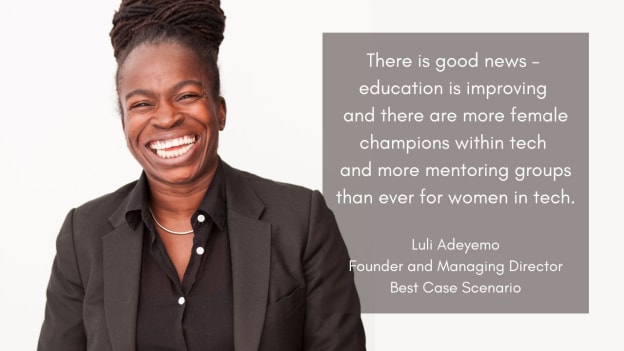Luli Adeyemo: Smashing gender bias begins in school

The career path of a woman in the male-dominated technology industry is never easy. Misconceptions, misogyny, and gender bias are just a few of the stumbling blocks that make climbing the ranks extra difficult for women. But it is not entirely impossible, especially now that we are in the age where women empowerment is becoming a norm.
The increasing number of female ministers in Australia is proof that women are slowly making their way to the top. But this may not be enough, said Luli Adeyemo, Founder and Managing Director of Best Case Scenario, a company that specialises in technology marketing. She believes there must be a focus on education to completely break gender bias.
In this interview with People Matters, Luli discusses why breaking barriers in gender dynamics in the tech industry should not just begin in the university, but also in the early years of schooling. She also lists down some of the do’s and don’ts that tech companies can follow to achieve a diverse and inclusive workspace.
What are the fundamental issues that prevent more women from entering the tech industry?
Let me answer that question by going back to school and gender stereotypes, now it is getting better with foundations like Code Like a Girl, but fundamentally we need to start promoting girls in tech/STEM from the onset.
Women still only take up a quarter of tech jobs in Australia, according to data from ABS. Also according to Australian Computer Society around 50% of women in technology jobs eventually left the profession.
A study by the Harvard Business Review highlights that the high dropout rate was due to several key factors, including “macho culture, isolation in the workforce, unclear and/or stalled career paths, inferior systems of rewards and extreme work pressures.” Attrition rates tended to peak when women were in their late 30s – a period when women find both family and career pressures increasing simultaneously. The impact of Covid also added to this pressure. At the peak in April 2020, almost 8% of Australian women had lost their jobs, and women’s total hours worked were down 12%. The figures for men were 4% and 7%.
But there is good news – education is improving and there are more female champions within tech and there are more mentoring groups than ever for women in tech. And today powerful women in tech are household names, such as Sherly Sandberg and YouTube's Susan Wojcicki.
Read more: How to break gender barriers in a male-dominated technology industry
Do you see trends such as sexism/chauvinism growing more rampant? Or are we seeing positive change?
A study shows that Australian men have some of the most sexist views in the Western world. The finding is part of new research conducted for International Women’s Day on behalf of the Global Institute for Women’s Leadership in London, which is led by former prime minister Julia Gillard. And Australia was second-highest in the world, behind only Malaysia, when asked if it was acceptable to use sexist or misogynistic language online, with 14% saying that it was OK. The global average was 8%.
I think change is coming as there is a realisation now both at corporate level and government level that diversity is needed to be innovative and grow, and I’m not just talking about gender diversity but the 20+ minority groups.
Key trends that show positive change is coming – acknowledgement that we need more women in the federal parliament to create a more equitable Australia. We can learn from Scandinavian parliaments with higher proportions of female MPs, where they have “very pro-women” policies.
Australian Prime Minister Anthony Albanese will have a record number of female ministers in his new cabinet, which is shaping up to become one of the most diverse governments in the country’s history.
Read more: Australia jobs summit to focus on equal pay, more opportunities for women
What are misconceptions we need to address when it comes to breaking down systemic barriers and shattering biases against women who want to pursue a meaningful career in tech?
I think Unconscious gender bias in the workplace needs to be addressed, it remains a significant barrier to women's career advancement. Even today if I am in a meeting with a room full of older males and I attend with an male peer they will refer questions to him rather than me. There is unconscious bias, they don’t realise they are doing it.
Recently, Kelly Hopping, chief marketing officer of Capterra, said that many people still think women don’t really understand or care about technology, there really is an assumption that women want to be in less technical roles, like HR or customer service. The women in technology that I work with smash this and again these misconceptions do not begin in university – they begin in the early years of schooling. But this is slowly changing.
What should companies start doing (and stop doing) to welcome more women into the field?
People want to see they’re represented in the workplace, not just a token to fulfil a quota for example. Creating an inclusive, safe environment is key, where everyone feels they believe. This is not just about gender; it’s also about attracting a workforce that is representative of the communities you serve.
What legacy would you like to build in business, tech and your professional and personal communities?
I’d like to be known as the person who fundamentally changed the diversity makeup of the tech sector workforce in Australia, by raising the profile of tech as a career option and influencing the pathways for people to transition into a tech career. In doing so, giving everybody in the community an opportunity to work in one of the most exciting industries on the planet.















